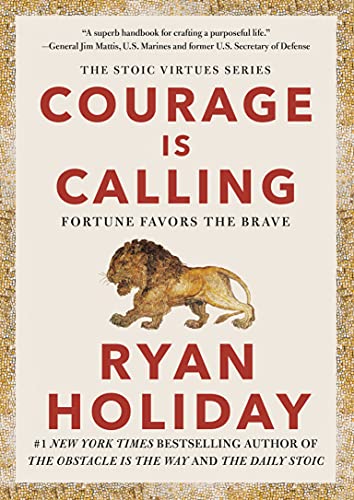Courage is Calling, by Ryan Holiday
Courage is calling is the first in a book series by Ryan Holiday about courage, wisdom, justice, and temperance, the four cardinal virtues. As C.S. Lewis explains, “courage is not simply one of the virtues, but the form of every virtue at the testing point.”
The book is very well written. The ideas in each chapter are reinforced by well chosen stories of historical characters. It doesn’t pretend to dive into philosophical definitions, but to give practical advice and challenge the reader to face her fears. I’ve read several of Ryan Holiday’s book, and so far this is the one I enjoyed most.
The book is divided in three parts, the first is about fear. “(…) fear—in all its forms, from terror to apathy to hatred to playing it small—is the enemy of courage. We are in a battle against fear. (…) The opposite word for courage is not cowardice. It’s apathy, disenchantment, despair.”
Courage is the management of and the triumph over fear. It’s the decision—in a moment of peril, or day in and day out—to take ownership, to assert agency, over a situation, over yourself, over the fate that everyone else has resigned themselves to.
At the root of most fear is what other people think of us. The fear of calling attention to ourselves. Other times, we may think we lack agency or it’s the fear of the uncertain. “The paradox of course is that almost everything new, everything impressive, everything right, was done over the loud objections of the status quo. Most of what is beloved now was looked down on at the time of its creation or adoption by people who now pretend that never happened.”
When we dare to be courageous, there are no guarantees. All growth is a leap of faith. “No one can tell you that your plan will succeed. No one can tell you what their answer to your question will be. No one can guarantee you’ll make it home alive. They can’t even tell you how far down the hole goes. If they could, if it wasn’t scary, everyone would do it. And then wouldn’t need to be done by you, now would it?”
Some people hide behind the search of certainties. They “wait for the stairs that will never come. They want to know the probabilities. They want time to prepare. They want assurances. They hope for a reprieve. They’re willing to give up anything to get these things, including this moment of opportunity that will never, ever come back.”
Sometimes fear is not a sign of danger, but of opportunity.
[Theodore] Roosevelt’s niece, Eleanor, (…) talked about doing the thing you cannot do. It is almost always the thing you should do. When something tells you that you’re not allowed. When someone tells you that you’ll regret your decision. When the pit in your stomach makes you hesitate.
But what will our customers think? But what if our competitors use this against us? What if it doesn’t work? Will people be mad at me?
Damn them all.
How do we defeat fear? We learn to dance with it. We explore our impressions, break them down logically. We realize that although there are obstacles and uncertainties, they are not as many as we think. As Tim Ferriss proposes, we should define our fears instead of our goals. What is the worst that could happen?
We choose what voice we will listen to. We choose whether we’ll play it safe, think small, be afraid, conform, hide, or be cynical. We choose whether we will break these fears down, whether we’ll go our own way, whether we look down over the side of the narrow bridge and turn back—or keep going.
The second part of the book is about courage itself. Courage is ment to be cultivated on a daily basis. We need to be courageous in our daily duties. We need courage to keep our promise to deliver that work on time, to smile when we are tired, to try again one more time. Our daily battles prepare us for more challenging moments.
We also train and practice out of our comfort zone, so that we are prepared for situations requiring exceptional courage.
Because it’s the most important thing. With practice, you go through the actions in your mind. You build the muscle memory of what you do in this situation or that one. You learn how to fortify and are fortified in the process. You run through the drills, you play your scales. You have someone ask you purposely tough questions. You get comfortable with discomfort. You train at your T-pace for deliberate intervals, raising your threshold as a runner. You familiarize. You assemble your rifle with a blindfold on, you work out with a weight vest on. You do it a thousand times, and then a thousand times more while there is no pressure so that when there is, you’ll know exactly what to do.

Risk and bad odds don’t disappear when we exercise courage. Courage means getting back up when you’ve been broken. It means recognizing that we are not alone in this journey and having the courage to ask for help. “We’re in this mission together. We’re comrades. Ask for help. It’s not just brave, it’s the right thing to do.”
The last part of the book is about the heroic. The definition of heroic is risking oneself for someone else. To go beyond the call. It’s the sacrifice for others. “Not all selflessness requires the ultimate sacrifice, but there is no selflessness without sacrifice.”
Heroism is the ultimate disregard of the ego, because it’s selfless also in the sense that—as history shows—we may not be recognized for our generosity.
Courage is Calling is an inspiring book. It will challenge you to rise to your best at every chapter.
Because if you don’t adopt that kid, who will? If you don’t start that business, who will? If you don’t finally say those three magic words today, when will you?
Likely no one, likely never. And if someone does, it won’t be you—it will be different. It will not be as good. It will not be what you bring to the table. The belief that an individual can make a difference is the first step. The next is understanding that you can be that person.
